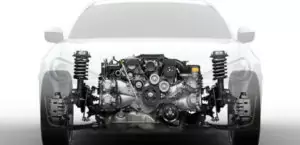The 2.0-liter Volkswagen APK 8v engine was produced by the concern from 1998 to 2002 and was installed on the fourth Golf and a host of other models produced on its platform. This power unit was essentially a EURO 2 version of the well-known motor under the AQY index.
The EA113-2.0 series includes: APK, AQY, AXA, AZJ, AZM, ALT, BSX.
Specifications
| Production years | 1998-2002 |
| Displacement, cc | 1984 |
| Fuel system | injector |
| Power output, hp | 116 |
| Torque output, Nm | 170 |
| Cylinder block | cast iron R4 |
| Block head | aluminum 8v |
| Cylinder bore, mm | 82.5 |
| Piston stroke, mm | 92.8 |
| Compression ratio | 10.5 |
| Features | SOHC |
| Hydraulic lifters | yes |
| Timing drive | belt |
| Phase regulator | no |
| Turbocharging | no |
| Recommended engine oil | 5W-30 |
| Engine oil capacity, liter | 4.0 |
| Fuel type | petrol |
| Euro standards | EURO 2 |
| Fuel consumption, L/100 km (for VW Golf 1999) — city — highway — combined |
10.8 6.0 7.9 |
| Engine lifespan, km | ~420 000 |
The engine was installed on:
- Skoda Octavia 1 (1U) in 1999 – 2002;
- Volkswagen Beetle 1 (9C) in 1998 – 2001;
- Volkswagen Bora 1 (1J) in 1998 – 2001;
- Volkswagen Golf 4 (1J) in 1998 – 2001.
Disadvantages of the VW APK engine
- This motor is structurally simple and worries its owners only over trifles.
- Only some components of the ignition system have low reliability.
- Electrical failures occur periodically, more often than others the crankshaft position sensor, coolant temperature sensor and idle speed controller are buggy.
- The estimated resource of the timing belt is 90,000 km, but when it breaks, the valves do not bend.
- By about 250,000 km, rings usually lie and oil consumption appears.






